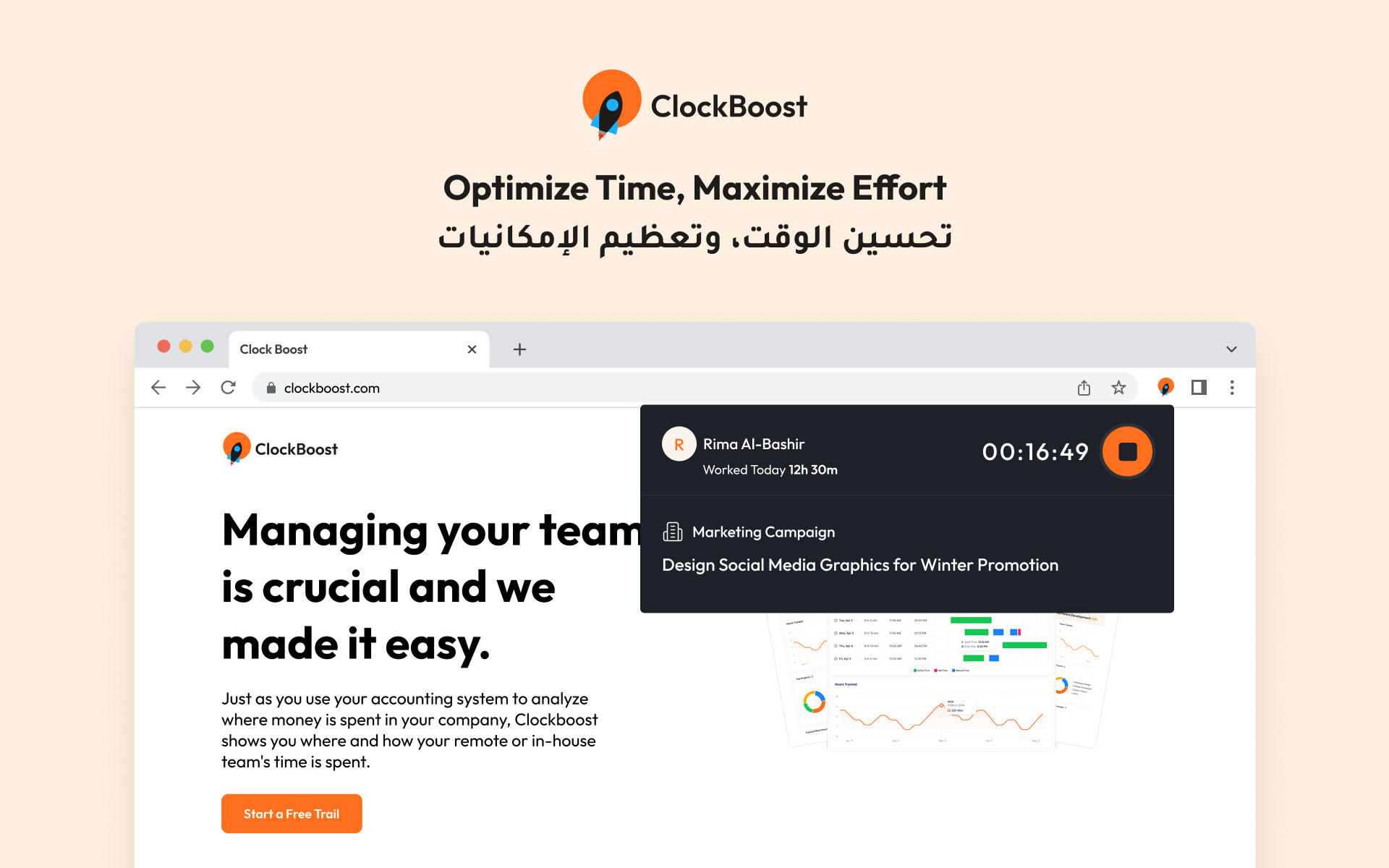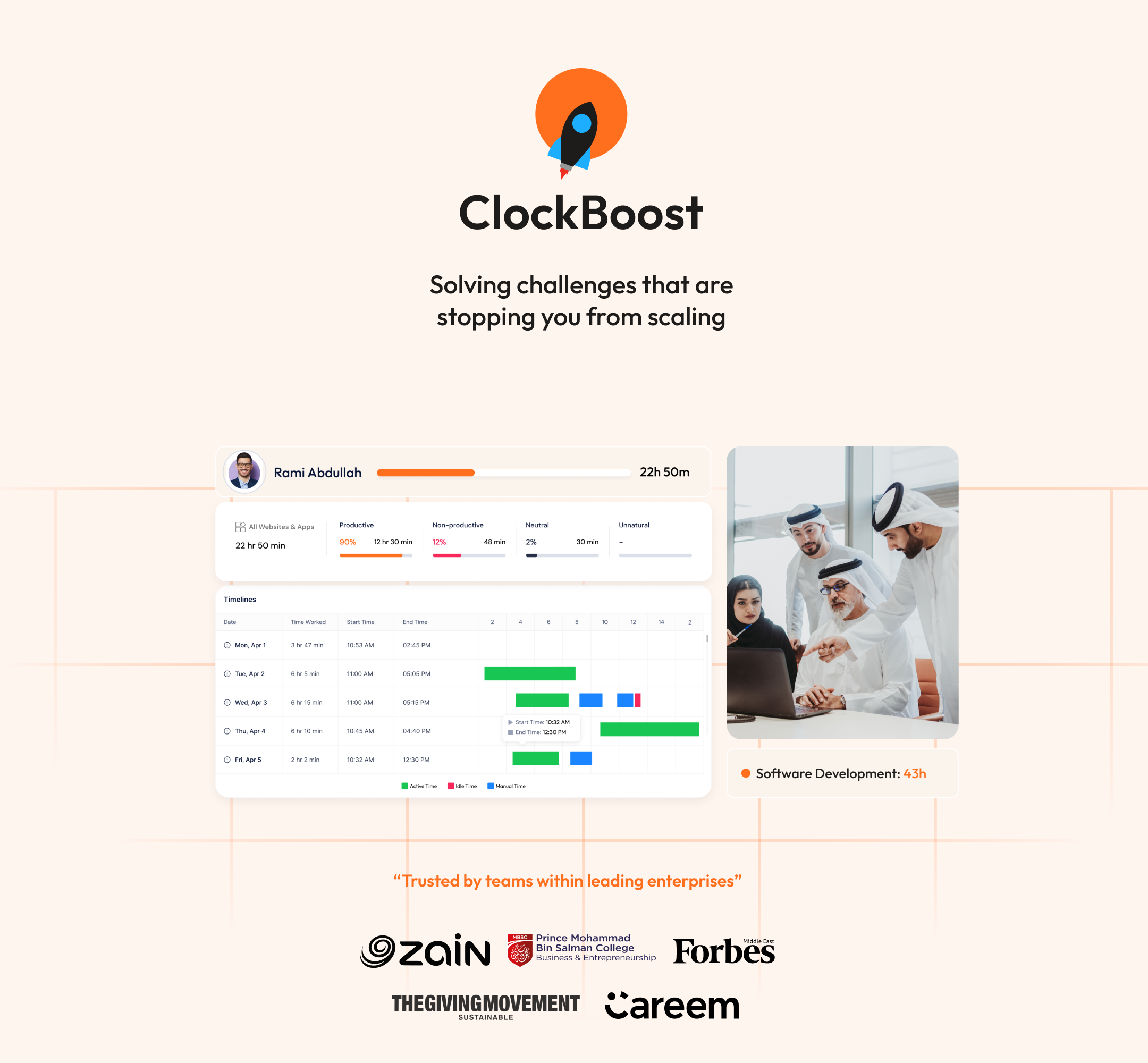
The Future of Remote Work Efficiency in the Gulf
Introduction: The Gulf’s Remote Reality Is Here to Stay
Remote work in the Gulf region is no longer a pandemic-era experiment; it’s a long-term shift. From Dubai’s digital nomad visa to Saudi Arabia’s massive ICT investments, the infrastructure and appetite for hybrid and remote work are stronger than ever. But as tech teams become more distributed, the question facing HR leaders, founders, and operations leads is no longer “Should we allow remote work?” It’s “How do we make it efficient, fair, and sustainable?”
That’s where a smarter, localized approach comes in. In this guide, we’ll explore how Gulf tech companies can future-proof their remote work strategies—focusing on outcomes, not activity, with help from AI-powered, privacy-conscious platforms like ClockBoost.
Why Remote Work Isn’t Going Anywhere in the Gulf
The numbers speak volumes. Over 90 percent of UAE-based tech workers now prefer hybrid or fully remote roles. In Saudi Arabia, government-backed digital transformation plans are pumping billions into cloud-first infrastructure and cybersecurity—creating the perfect environment for remote growth. Qatar, Bahrain, and Oman are following suit, offering better internet, coworking hubs, and flexible labor frameworks.
More importantly, employees are seeing results:
- Improved focus and morale
- Reduced commute stress
- Higher retention rates
But efficiency doesn't automatically follow flexibility. Without clear processes, teams risk drifting, working more but achieving less. So, what does remote work efficiency look like in practice?
Defining Remote Work Efficiency in 2025
Efficiency in remote teams isn’t about clocking in early or answering Slack messages fast. It’s about output per hour, delivering value consistently without burning out.
In the Gulf context, this also means balancing:
- Autonomy and accountability
- Visibility and trust
- Speed and sustainability
This is where many tools fall short; they're designed for Western teams and ignore the Gulf’s cultural expectations, such as role-based hierarchies, blended teams (expats and locals), and the importance of trust.
A platform like ClockBoost is purpose-built for this landscape. It provides transparency without surveillance, and structure without rigidity.
Key Barriers to Efficient Remote Work Today
Even with talent and tech in place, Gulf teams often face friction points like:
- Siloed tools: Tasks on Asana, calls on Zoom, code on GitHub, no central view of productivity
- Lack of visibility: Leaders don’t know where time goes, yet fear being invasive
- Global tools ignoring regional needs: No Arabic support, weak local compliance (PDPL), and misaligned UX
- Activity-based tracking: Focus on keystrokes or idle time instead of meaningful KPIs
These barriers lead to micromanagement, burnout, or worse, teams that simply go through the motions.
Five Strategies to Boost Remote Work Efficiency
1. Automate Time Tracking, Not Trust
Micromanagement kills morale. ClockBoost uses automatic, role-based time tracking that captures both online and offline work—without making your team feel watched. It respects privacy while ensuring visibility.
2. Use KPI Dashboards for Insight, Not Oversight
Don’t just monitor hours, measure progress. ClockBoost’s KPI dashboards help operations leads and HR managers see which teams are delivering outcomes, not just logging time.
3. Embrace Hybrid with Role-Based Flexibility
The best-performing Gulf teams balance structure with flexibility. ClockBoost allows for role-specific settings, so developers, designers, and support staff can have tailored workflows that reflect how they actually work.
4. Integrate Workflows into a Single View
Jumping between tools creates blind spots. ClockBoost integrates with Google Workspace, Asana, Jira, ClickUp, Trello, and GitHub, giving you a single source of truth, no more guessing who did what.
5. Focus on Outcomes, Not Activity
True efficiency comes from aligning hours with impact. ClockBoost helps leaders spot trends: where time is wasted, when idle time spikes, and which tasks are driving business value.
Why ClockBoost Is Built for the Gulf’s Remote Future
Most global time-tracking tools miss the mark when it comes to the Gulf:
- No Arabic interface
- No PDPL or regional data compliance
- No offline time tracking
- Focused on micromanagement, not enablement
ClockBoost changes the game by being:
- Arabic-first, with English toggle
- Compliant with PDPL, SSL, and PCI standards
- Built for hybrid and remote Gulf teams
- Free for three months, no credit card required
Whether you’re managing a digital agency in Dubai or a SaaS startup in Riyadh, ClockBoost gives you the tools to scale productivity without compromising on team culture or privacy.
Conclusion: Your Remote Work Reset Starts Now
Remote work efficiency isn’t just about tools; it’s about trust, systems, and smart decision-making. For Gulf tech leaders ready to scale without surveillance, ClockBoost offers a powerful, culturally aligned way to measure what matters.
Ready to unlock your team’s potential?
Start your free three-month trial with ClockBoost and see what true remote productivity looks like.


























.png)

